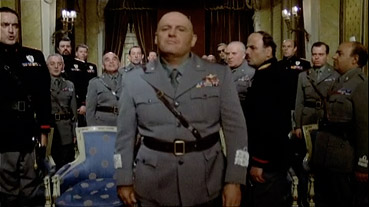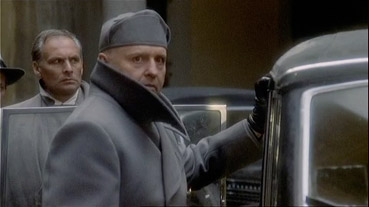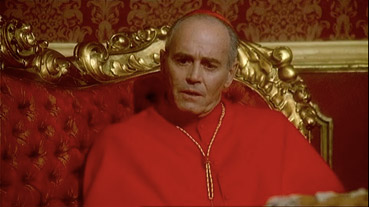| "Democracy is beautiful in theory; in practice it is a fallacy." |
| Benito Mussolini |
As stated in these pages before, democracy is a wonderful idea and, in practice, a catastrophic national (and by implication, international) miscalculation. I'm not siding with the fascist dictator here, just acknowledging a basic truth. I mean, democracy does have an idealistic logic to it even if it throws up warmongers and simpletons – sometimes simultaneously. If you elect your leaders based on a majority vote and you also accept that the majority of any population is swimming around in the shallow end of intelligence, you're going to get an ordinary – some may say sub–par – person to lead. In fact, in the US, candidates big up their 'normality' knowing its worth, hence Sarah Palin as 'the hockey mom' and Bush 'the beer buddy' etc. I do not want to be led by an ordinary person. Mussolini was far from 'ordinary' but I don't want to be led by him either. Welcome to politics 101.
The publicly acknowledged intellectual (go figure), President Barack Obama, sits in the White House now, a rather unusual but welcome elected official. Of course, he had to campaign (or convince himself to campaign) below his weight so to speak. If you want political success in the States, you have to profess a belief in a deity (who for some reason loves your country above all others) and as much as I'd like to believe that Obama is an honest man, I can't believe someone with that level of smarts subscribes to a divine power that marks out the United States for special attention. Bless the man twice over for mentioning atheists in his inauguration speech. We've come quite a way since the first President George Bush made this extraordinary announcement... "I don't know that atheists should be considered as citizens, nor should they be considered patriots. This is one nation under God." Aiee! It was always the facet of Jed Bartlett's character that I could never understand (Bartlett was the fictional president from The West Wing played by Martin Sheen). He was stoutly religious going so far as to call God a feckless thug in one memorable episode. So how does an elected official manage to bring a country to its knees? George W. Bush should have read more history books. One would have been good – and not 'The Very Hungry Caterpillar'.

The life of Benito Mussolini is an historical minefield for the casual observer of past events. Yes, we research our movies here at Outsider but the Italian dictator who partnered Hitler in WWII because he could sense which way the wind was blowing, was a quagmire of contradiction, power, delusion, cowardice, strength and frailty. Let's not forget an ego the size of the Isle of Wight. His judgement of the wind's direction let him down eventually but he had the sense to warn Hitler not to invade Russia. That got no one very far at all, least of all the Nazis. In the British Isles, we had it easy (in terms of formulating a moral position predisposed by geography). We live on an island. Those that wish to conquer us have to negotiate that wonderful protective stretch of water known as the English Channel. In the middle ages, Vikings traversed water with abandon. Hitler's hordes had more of a hard time. It was relatively easy for us, as a nation, to see Hitler's Nazis as an evil force hell bent on changing the world to match the ideals of the Swastika. After all, we had Captain Mainwaring on our side and you don't get more decent than that.
So the Nazis were evil (absurd to generalize given there was at least one Nazi who thought Hitler was a deranged lunatic but that's in another review not written yet. You know the guy – he looked like Tom Cruise...) but in a war, generalizations are useful. In Italy at the time, things were significantly less clear cut. Ideologies were not erections of stone that people could see and react against or embrace. One man's fascist was another's commie and it all got dreadfully complex. After all, bullets weren't judgemental, just the final tool with which to enforce a belief, a shot at underlining the ideology. Mussolini had hooked himself up to Hitler and when the Allied tide swept the 3rd Reich back to inner Europe, the Italian self styled 'Il Duce' (or 'the Leader') saw the writing on the wall just a little too late. It's these last four days of Mussolini's life that are covered in The Last Days of Mussolini.
Suddenly everyone wanted a piece of Mussolini as played by Rod Steiger. In Milan, Steiger grants an audience with his enemies via the church (a relatively inanimate Henry Fonda as Cardinale Schuster, the peace broker). Alas, Mussolini is not used to making deals and pretty much seals his fate with an innate arrogance guaranteed to invite a bullet. The Allied forces wanted him alive and tried for war crimes. Hitler wanted all he could get as his world (thankfully) fell around his ears. The partisans, those who resisted the Nazis in occupied Italy, had already passed a death sentence on Mussolini and the dictator's last days were spent in attempting to exert power that was leaking from him as if he were already bullet–holed and finding a safe passage with his mistress to Switzerland, the destination of most disgraced tyrants. When buffeted from one location to the next, Steiger's Mussolini is all introspection. When closing his eyes, we get newsreel of his glory days and him, in full uniform, presiding over this internal home cinema. His 'fantasy' chiefs of staff are sitting as the audience and the matted black and white screen is very crudely achieved. This, in his own head, is where he's still the man who took Italy by storm before the stormtroopers took it off him. It's where he has his only peace.

Intimacy with his mistress is snatched and never really savoured. But Steiger does not go out of the way to make the man likeable. The best he could have achieved was to have us understand what a man like that is thinking as his end approaches. There was little dignity but if the definition of same is being silent right until the final shot, then he had some kind of decorum – either that or the prospect of his inevitable death was one he could not fight and so was frozen to his execution spot. If the movie is to be believed, Mussolini died with his hands thrust into his greatcoat's pockets. His killer, a partisan with very specific orders, was played by the impossibly handsome Franco Nero whose charisma and drive takes over the last quarter of the film giving it a needed kick up the rear. It's still important to remember that Mussolini was a monster who controlled Italy with almost absolute power for decades and turned the political process into a farce siphoning off more and more power until the country was invaded by the Nazis who were subsequently welcomed by the dictator. After all, the definition of fascism (co–founded by Mussolini) is loosely 'controlled Darwinism'. The fittest must destroy the less fit... Society will become strong etc. What will be remembered of Mussolini's rule, as one character says in the film, "He made the trains run on time..." That's one hell of an epitaph.
Technically, The Last Days Of Mussolini is a real curio. Director Carlo Lizzani often places his leads at the very edge of frame. Whether this was intentional is hard to fathom. But by far the most curious is the soundtrack. It is very clear from a simple viewing with English subtitles that both American leads are performing in English. Do those sync tracks still exist? If so, why are they not available for this region 2 disc? Depending on your own point of view, how much power and effect is inherent in a performance from the vocal delivery? From where I sit it's a major player. Having been robbed of that, Steiger in particular merely comes across as comprehensively sullen as he waits for the inevitable bullet. Watch In The Heat Of The Night and tell me Steiger's voice wasn't important to that extraordinary performance. The other oddity is that despite Franco Nero being a native Italian speaker, it looks to all the world like he's been dubbed too.
The sync is ever so slightly off and the soundtrack itself is a constant shriek of harsh Italian. I have a theory as to why this is a problem. Many years ago I worked on a film made in Madagascar. As a courtesy, we were to deliver a Malagasy soundtrack for the government. I supervised the re–recording with a Madagascan student and it was clear after the first five minutes that we had a major problem. It's the translation curse. In English, your sentence has fifteen syllables. In native Malagasy, it translates into sixty–five. You have a choice. Cut out three quarters of your script or rewrite what you have down to the bare essentials. Perhaps the Italian simply over–ran the English and that's why the first half hour is a tirade of one raised voice after another.

It seems that all the actors were speaking a cornucopia of different languages and the harshest voice over artists were found to replace the originals' vocal performances. I do wonder what kind of film this would be if the Babel problem had been addressed in one way or another. But US actors were vital to the chance of the film being well marketed and Steiger and Fonda were both still big stars in 1974. But there's no subtlety to the mix and voices are not only dominant but for the first half hour, there's nothing else but end to end voices. I've never been so aware of such an audio assault and Italian is usually rather beautiful to listen to. Maybe it's just the harshness of the recording. But in the end, this presentation does the movie – lurking beneath the torrent of harsh sound – a disservice.
The picture is presented as 1.85:1 anamorphically enhanced and despite a constant graininess throughout, the contrast and colour levels are a little muted but perfectly OK.
The mono Dolby Digital 2.0 soundtrack is fine although as mentioned in the main review, the Italian dialogue seems to have its own harsh level all its own. Relentless doesn't cover it. There are no other language subtitles except for English. The subtitles are often incorrect (wrong spellings lead to the wrong meanings on a few occasions; 'attach' when it should read 'attack' for example) and for an odd reason, the very few bits of English are subtitled in English.
You are given an option to play the main feature with or without subtitles. As the movie is in Italian and you're reading this review, I'd go for the subtitles.
Interview Carlo Lizzani (16' 08")
A measured and 'recollected in hindsight' interview with the director whose industry savvy led him to cast two American stars to allow his film the benefit of glossier marketing.
Trailer (1' 52")
1974 was the year before Hollywood got bloated and expected blockbuster performance but also well ahead of the youth explosion lead by Mussolini star's son, Peter in Easy Rider. Last Days Of Mussolini's trailer is definitely one of the more stylish I've come across. Told with quotes from the movie and – with the exception of a machine gun spitting bullets – freeze frame stills only bled through with a specific and very effective dissolve (imagine a burning paper dissolve but neater). I question the odd inclusion of the lead actor's execution (even if you are aware of the history, what's the point in giving away the ending in the trailer?). This is a very fine example of a damn good trailer.
Photo Gallery
28 pictures, colour and black and white, some stills, some blow ups from the film. Nothing too exciting. I still wonder aloud who buys a DVD for its Photo Gallery...
The sound ultimately lets this movie down. The performances, without benefit of the actors' vocal contribution, really smack the film down hard. As a slice of history it's very effective and seems to be historically accurate. If you can get over the dub, there's an entertaining little drama to be mined from the cacophony.
|